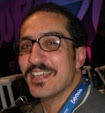Number 9 Dream
I'm very flattered that Twanny Cassar declared that the Maltese word poddata, which I coined for my podcasts, is one of his favourite new words in our native language. The term came about after MaltaMedia's Editorial Director Martin Debattista asked me if I had a Maltese word for podcasting, when I first created the world's first Maltese podcasting series last year.
We're now on the ninth podcast in my Mużika Mod Ieħor series. Since we're just one week away from the 2006 Malta Song for Europe festival, I thought it would be a good idea to focus my podcast around this popular annual appointment in the Maltese music calendar. Rather than simply play some of the tracks from this year's contest, I decided to play some songs by some of the better singers who have represented Malta at the Eurovision Song Contest over the years.
While Chiara is Malta's highest ranking Eurovision performer, my favourite remains Ira Losco, who managed to ignite Malta's long-standing desire to win the Eurovision more than ever. This week's podcast opens with a live recording of her former band Tiara doing a song called Super Pollen Colour from Peter Busuttil's Red, originally broadcast on the 6th of November 2001 - when Ira Losco was still a relatively unknown rock singer.
If Malta had a musical equivalent of the Triton Fountain at City Gate, William Mangion would be a great contender for the third giant position, along with Marc Storace and Jon Lukas. He is best known for representing Malta at the 1993 Eurovision. That was a time when all Maltese songs had to be presented in Maltese and English to be considered for the Malta Song for Europe contest. This practice was abandoned about 10 years ago when someone realized how silly it is to ask singers and songwriters to do this when someone (else?) had already decided that Malta's Eurovision entry must be sung in English if we ever want to win this immensely popular song contest. William Mangion's This Time was called Issa in the Maltese version and featured lyrics by Jesmond Tedesco Triccas. Like the English-language version of the same song, Issa features backing vocals from Phyllis Anne Brincat and Moira Stafrace, who won the following year's contest along with her husband Chris, the guitarist heard on this song. Chris and William were both members of a band called Getting Closer until that point.
Some singers have gone on to greater things since representing Malta at the Eurovision Song Contest. One of these is Brazilian-born Maltese singer Miriam Christine, who has taken to recording what is arguably some Malta's best-ever R&B. From her CD album Little Zee I have selected a Synchronized for this week's podcast. This song has a really cool video, which you can see on her website at any time. Miriam Christine has also written a song for Manuel for this year's Song for Europe. So perhaps, although she's wise enough to never take part in the song contest as a singer, she's prolific enough to write what could be a winning song for another singer. I haven't heard the new song yet, so I'll reserve judgment until my next blog entry on this year's songs, before my next podcast.
I'm still reeling from Malta's missed opportunity at the 3rd edition of the Heavy Metal Eurovision. I can't believe that there was no Maltese representation during the most recent contest run for the Heavy Metal Eurovision. I know it may be a little too old to qualify, but my money would have been on Norm Rejection's Malta Not for Sale. What a superb rock song! If only there were a couple of songs like this on the regular Song for Europe contest. I think it's a pity we no longer care to promote Maltese-language songs through what is undoubtedly Malta's most popular annual music event. Thankfully Xtruppaw are recording their first CD album right now. I can't wait to play some of that on my podcast.
The RSS feed for the podcast is available here or you can simply click here to subscribe directly with iTunes. You can also add the latest episodes to your My Yahoo! page.

















